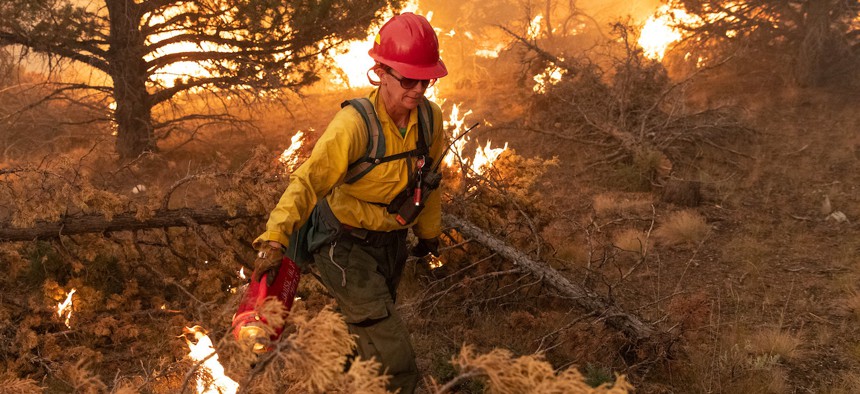
A firefighter uses a drip torch to ignite slash piles on the Bureau of Land Management's Trout Springs Prescribed Fire in southwest Idaho in 2019. Neal Herbert/Interior Department
As shutdown looms, fed firefighters express concern over continuity of pay and benefits
If Congress fails to stop a funding cutoff "many of us might not get paid, or at least won’t get paid on time, and that’s a real problem," says one firefighter.
House lawmakers at the end of last week approved an Interior, Environment and Related Agencies appropriations bill for FY 2024, legislation that includes funding for continuation of current pay for wildland firefighters. Not surprisingly, the National Federation of Federal Employees—the union representing affected employees—is applauding this important step.
But the union and the firefighters it represents remain vigilant and are pushing hard for passage in the Senate, and for getting past the current danger—yet again, as all feds know—of a possible shutdown. The deadline to avert one looms, Nov. 17, just barely over a week away.
“This is a positive step in the right direction to avoid the looming pay cliff facing wildland firefighters,” NFFE National President Randy Erwin said in a statement, heralding the positive move.
“With government funding set to run out in less than two weeks, it is imperative that both chambers of Congress include wildland firefighter pay among their highest priorities when advancing legislation to keep the government open and operational,” he added, spotlighting the danger ahead.
“Right now, Congress must find a way to do this before the current continuing resolution runs out on Nov. 17,” Erwin said. “Once that hurdle is cleared, NFFE will continue pressuring lawmakers to pass the Wildland Firefighter Paycheck Protection Act to permanently safeguard firefighter salaries. While there is still much work to be done, I am confident that Congress will do the right thing and support wildland firefighters on the frontlines.”
But firefighters in other parts of the federal workforce are also very concerned about the current shutdown threat. In fact, the repeated threats in recent years, themselves, are wearing.
Brandon Hartzog, a civilian firefighter paramedic with the Navy—and an executive vice president with his union, the American Federation of Government Employees—says everyone at work is affected by the chaos.
“All this shutdown threat feels unstable, you know?” he told Government Executive. “Would you go for a job that you weren’t sure of pay or that funding might be cut or might end? Even if we have a mission, everybody needs a paycheck, right? And, if you knew there was another job using your skills that wasn’t so unstable and offered equal pay or even better benefits, you and some of the other employees might leave to go there. Yes, I mean other fire departments.”
Hartzog, like other feds charged with controlling conflagrations across the country, frequently remarks that many areas of the country are suffering through a period of serious drought and increased fire threat. He said he knows the Government Employee Fair Treatment Act is in place to ensure that feds are automatically provided with back pay in shutdowns—but in practice they are still very disruptive, and scare away prospective feds.
“Look, we would still go to work,” he said, regarding the unpleasant possibility that Congress fails to stop a funding cutoff ahead. “But many of us might not get paid, or at least won’t get paid on time, and that’s a real problem. For the public, things aren't going to just burn without our intervening—but some of our people are going to get burned out, because they have family at home to take care of, and there can be delays and not enough income coming in meanwhile.”
Anthony R. Wheeler, an expert on industrial relations and H.R., and dean of the School of Business Administration at Widener University, told Government Executive that "the mere threats of shutdowns have the same psychological effect as the actual shutdowns themselves. From an employee perspective, the constant news about possible shutdowns and the instability at the Capitol in Congress create anxiety, increase emotional exhaustion, and decrease performance of federal employees. At least they still receive pay as the government is open, but the back-and-forth of shutdown threats hurts federal workforces."
NEXT STORY: OPM begins prep for annual retirement surge






